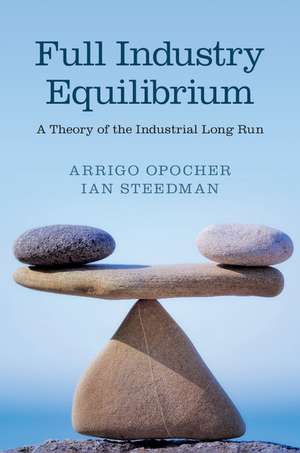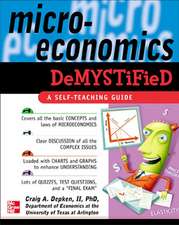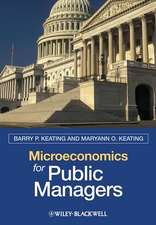Full Industry Equilibrium: A Theory of the Industrial Long Run
Autor Arrigo Opocher, Ian Steedmanen Limba Engleză Hardback – 27 mai 2015
| Toate formatele și edițiile | Preț | Express |
|---|---|---|
| Paperback (1) | 282.10 lei 43-57 zile | |
| Cambridge University Press – 8 ian 2020 | 282.10 lei 43-57 zile | |
| Hardback (1) | 723.27 lei 43-57 zile | |
| Cambridge University Press – 27 mai 2015 | 723.27 lei 43-57 zile |
Preț: 723.27 lei
Preț vechi: 841.02 lei
-14% Nou
Puncte Express: 1085
Preț estimativ în valută:
138.40€ • 144.86$ • 115.19£
138.40€ • 144.86$ • 115.19£
Carte tipărită la comandă
Livrare economică 31 martie-14 aprilie
Preluare comenzi: 021 569.72.76
Specificații
ISBN-13: 9781107097797
ISBN-10: 1107097797
Pagini: 232
Ilustrații: 26 b/w illus. 12 tables
Dimensiuni: 157 x 236 x 20 mm
Greutate: 0.48 kg
Editura: Cambridge University Press
Colecția Cambridge University Press
Locul publicării:New York, United States
ISBN-10: 1107097797
Pagini: 232
Ilustrații: 26 b/w illus. 12 tables
Dimensiuni: 157 x 236 x 20 mm
Greutate: 0.48 kg
Editura: Cambridge University Press
Colecția Cambridge University Press
Locul publicării:New York, United States
Cuprins
Preface; Introduction; 1. Taking seriously the tendency to zero net profits; 2. An isolated industry; 3. Multiproduct firms; 4. Interdependent industries; 5. Industry-level input use. Some aftershocks from capital theory; 6. The 'autonomous' components of input prices; 7. The effects of taxation; 8. Productivity increase; 9. Full industry equilibrium in retrospect; 10. Conclusion; References; Index.
Recenzii
'Required reading for any economist with an interest in the long-run equilibria properties of firms and industries. Many startling new results challenge conventional beliefs and provide a path-breaking generalization of Sraffa's work. Highly recommended.' Edwin Burmeister, Commonwealth Professor of Economics Emeritus, University of Virginia and Research Professor of Economics Emeritus, Duke University
'Great economists have always been keen to analyse the systemic effects of a freely competitive environment in a capitalist economy which contained a tendency to establishing a uniform rate of profit in all industries. Different developments within different approaches examined aspects of this overall insight but tended to ignore one another. Arrigo Opocher and Ian Steedman have now made a large step forward by integrating with great skill and technical virtuosity two major alternative approaches in their theory of the industrial long run, so substituting harmony and good sense for previous conflict and incoherence.' G. C. Harcourt, Emeritus Reader in the History of Economic Theory, University of Cambridge; Professor Emeritus, University of Adelaide; Visiting Professorial Fellow, University of New South Wales
'The book breaks new ground in an area, microeconomics, where widespread opinion has it that the theory of the subject is complete. Far from it! The authors show that the results derived within a coherent long-period framework, in which the attention focuses on 'full industry equilibrium', differ markedly from those based on the usual ceteris paribus assumption. The latter may not only be 'quantitatively' misleading, but even point qualitatively in the wrong direction. The profession is well advised to take on board the important findings of this fascinating book.' Heinz D. Kurz, Director of the Graz Schumpeter Centre, University of Graz
'A new wave of debates of high theory related to long-period industry equilibrium analysis that takes seriously the inter-industry connections is coming. The trigger is this fascinating book by Arrigo Opocher and Ian Steedman. The authors have a deep knowledge of the debates in the 1960s and 1970s, but in this book they go far beyond. It will be an essential reading for all microeconomists and industrial economists in the decades to come.' Neri Salvadori, University of Pisa
'Great economists have always been keen to analyse the systemic effects of a freely competitive environment in a capitalist economy which contained a tendency to establishing a uniform rate of profit in all industries. Different developments within different approaches examined aspects of this overall insight but tended to ignore one another. Arrigo Opocher and Ian Steedman have now made a large step forward by integrating with great skill and technical virtuosity two major alternative approaches in their theory of the industrial long run, so substituting harmony and good sense for previous conflict and incoherence.' G. C. Harcourt, Emeritus Reader in the History of Economic Theory, University of Cambridge; Professor Emeritus, University of Adelaide; Visiting Professorial Fellow, University of New South Wales
'The book breaks new ground in an area, microeconomics, where widespread opinion has it that the theory of the subject is complete. Far from it! The authors show that the results derived within a coherent long-period framework, in which the attention focuses on 'full industry equilibrium', differ markedly from those based on the usual ceteris paribus assumption. The latter may not only be 'quantitatively' misleading, but even point qualitatively in the wrong direction. The profession is well advised to take on board the important findings of this fascinating book.' Heinz D. Kurz, Director of the Graz Schumpeter Centre, University of Graz
'A new wave of debates of high theory related to long-period industry equilibrium analysis that takes seriously the inter-industry connections is coming. The trigger is this fascinating book by Arrigo Opocher and Ian Steedman. The authors have a deep knowledge of the debates in the 1960s and 1970s, but in this book they go far beyond. It will be an essential reading for all microeconomists and industrial economists in the decades to come.' Neri Salvadori, University of Pisa
Notă biografică
Descriere
This original book develops a systematic zero-net-profit comparative statics theory to shed new light on the microeconomics of industry equilibrium.












